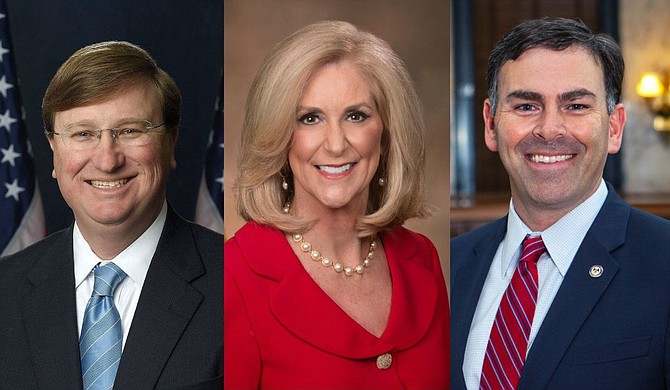The Mississippi Board of Election Commissioners—made up of Gov. Tate Reeves, Attorney General Lynn Fitch and Secretary of State Michael Watson—said that because only one candidate remained, no election was needed for the District 29 race. Reeves issued an order saying Robert Sanders had been elected. Photo courtesy State of Mississippi
JACKSON, Miss. (AP) — The Mississippi Supreme Court acted quickly Monday to block a circuit judge's order in a dispute over whether a special election is needed to fill a vacancy in the state House of Representatives.
Two people signed up to run in a Nov. 2 special election in District 29 in parts of Bolivar and Sunflower counties. The seat came open when Democratic Rep. Abe Hudson resigned in late August.
The Mississippi Board of Election Commissioners ruled Sept. 14 that one of the candidates failed to meet a residency requirement because he had switched his voter registration to Lafayette County. The commission—made up of Gov. Tate Reeves, Attorney General Lynn Fitch and Secretary of State Michael Watson—said that because only one candidate remained, no election was needed for the District 29 race. Reeves issued an order saying Robert Sanders had been elected.
The candidate whose residency was rejected, Keveon L. Taylor, is a law student at the University of Mississippi. He filed a court challenge, saying he is a lifelong resident Marigold in Bolivar County and had switched his registration to Lafayette County so he could vote there while studying at the university.
Hinds County Circuit Judge Adrienne Wooten ruled Monday that election commissioners were wrong about Taylor's residency.
The state attorney general's office immediately appealed to the state Supreme Court, arguing that a Hinds County circuit judge lacks jurisdiction over such an election dispute. Within hours, a panel of three justices put the circuit court order on hold while the election dispute remains on appeal to all nine justices.
Candidates in Mississippi special elections run without party labels. Republicans hold a wide majority in the state House.
More like this story
- New Mississippi House Member Formerly Secured the Senate
- Mississippi Seeks to Dismiss Lawsuit on Elections Amid COVID
- Hosemann Distributes Disputed Sample Ballot, Hood Advises Against Its Use
- No Reconsideration for 15-Week Abortion Ban Ruling, 5th Circuit Tells Mississippi
- Analysis: Judges Can't Order Attorney General to Take Cases



Comments
Use the comment form below to begin a discussion about this content.
comments powered by Disqus